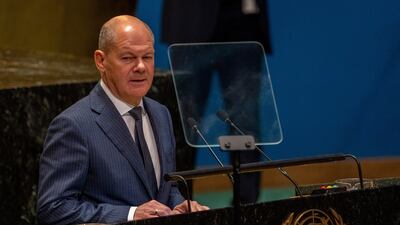German Chancellor Olaf Scholz's party vowed to take the fight to the far right on Monday after scoring a narrow win over the nationalist Alternative for Germany (AfD) in a state election in Brandenburg.
The AfD was denied a second landmark election victory but proclaimed itself the “party of the future” after exit polls showed it coming first among voters aged under 25.
The result gives a lift to Mr Scholz's Social Democrats (SPD) after a string of setbacks and could dampen talk of replacing him on the ticket at Germany's next general election next year, even as polls show support at rock bottom for the governing three-party coalition in Berlin.
“When the SPD takes the fight to the AfD, with a clear stance, we have a chance of finishing in first place,” said SPD chairman Lars Klingbeil. He said the a focus on bread-and-butter social issues had won support from voters in Brandenburg, even as migration and asylum dominate the political agenda in Berlin.
The SPD's candidate in Brandenburg, Dietmar Woidke, had distanced himself from Mr Scholz's government, and some MPs on the left and right warned the party not to get its hopes up despite coming from behind in the polls to beat AfD.
The SPD has governed the state surrounding Berlin since reunification in 1990. Provisional results showed it taking 30.9 per cent of the vote in Sunday's election, with the AfD on 29.1 per cent. The centre-right Christian Democratic Union, the main opposition to Mr Scholz, came a disappointing fourth.
The election was the third this month in the former East, the heartland of the AfD, whose victory in Thuringia on September 1 was the most significant far-right victory in Germany since the Nazi era. The party is under intelligence surveillance because of suspected extremist leanings.
German President Frank-Walter Steinmeier made a plea for unity on Monday at a meeting with survivors of political violence, including a racist shooting at shisha bars in Hanau in 2020 and an Islamist Christmas market attack in Berlin in 2016.
“When our language becomes coarser, when people feel less inhibited spreading hatred in millions of posts and likes online, when there is only black and white, when people cannot reconcile from conflicts, when certain people or groups are devalued and democratic institutions held in contempt, the erosion of democracy begins,” Mr Steinmeier said.
SPD challenges
The SPD is polling about 15 per cent at a national level, down from the 25.7 per cent it scored in the 2021 federal election. That is behind the AfD at about 20 per cent and opposition conservatives at 32 per cent. The three parties in Mr Scholz's left-liberal coalition are polling at about a combined 30 per cent.
The coalition has come under fire for its infighting and handling of immigration. In the formerly communist East, many voters are also critical of its delivery of weapons to Ukraine to help it fend off Russia's full-scale invasion.
Three-quarters of those who voted for the SPD did not do so out of conviction, but to fend off the AfD, according to an exit poll by broadcaster ARD. Turnout rose to 73 per cent from 61 per cent five years ago.
“Dietmar Woidke and his Brandenburg SPD have made a furious comeback in recent weeks,” said Mr Kuehnert. “For us in the federal SPD … the problems that lie ahead of us will not have got any bigger. But they have not got any smaller either,” he said.

The vote in Brandenburg comes three weeks after the Russia-friendly AfD topped the poll in Thuringia and also performed strongly in neighbouring Saxony, coming hot on the heels of the conservatives in second place.
Mr Woidke warned against complacency, noting the AfD was still gaining momentum. The ZDF poll suggested it had gained 5.7 percentage points since the last Brandenburg election in 2019.
AfD co-leader Tino Chrupalla noted the party had made strong gains among young voters – a trend that was reflected for far-right parties across Europe in the EU elections in June.

The new left-wing party Alliance Sahra Wagenknecht was on track to come in third place, at 12 per cent according to the poll, before the CDU at 11.6 per cent, underscoring the continuing upheavals in Germany's political landscape making predictions tricky.
The Greens, one of the junior partners in Mr Scholz's coalition at the federal level, came in at 4.7 per cent, just below the 5 per cent threshold to automatically enter state parliament.
The result achieved by the other junior coalition partner, the Free Democrats (FDP), was too insignificant to be reflected in the poll.


